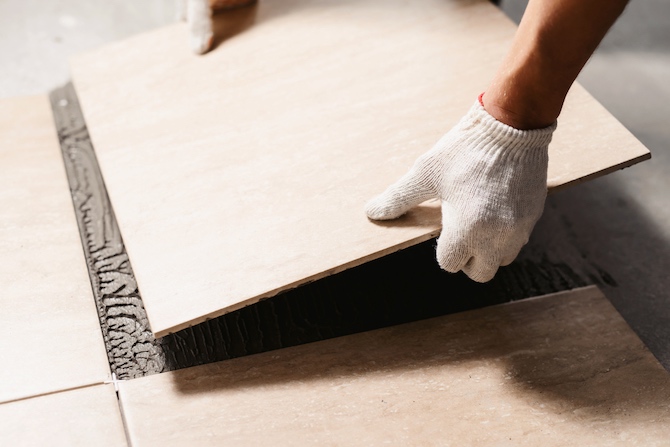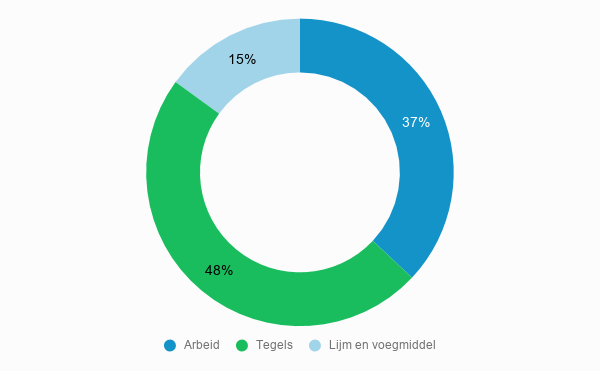Want to tile a room in your house and wondering what the options are within your budget? Renoca gives you an overview of all the information and costs involved in tiling.
What does tiling cost?
On average, it costs between £50 and £300 per m². Of course, this project depends on many factors, such as the total area and the type of tiles. These two variables can raise or lower the price considerably. See the price table below for all the prices you have to deal with when setting tiles:
| Factors | Average price per sqm |
|---|---|
| Tile laying | £25 – £40 |
| Tiles | £10 – £160 |
| Materials (glue, grout, etc.) | £ 10 – £ 20 |
| Total | £ 43 – £ 220 |
Find the best specialist for your project and get free quotes.
Start

Price examples
As a general rule, the more time-consuming the project, the higher the price. Keep in mind that the price is also influenced by the type of tiles (ceramic tiles or natural stone), the size of the tiles and the degree of difficulty in laying them. Curious about what you can expect? Below are some specific examples of total costs of tiling:
Costliest choice
If you only want to have your 8 m² kitchen wall tiled with ceramic tiles at £15 per m² and have this done by a tiler, you will spend a total of £450.
Average
If you have your bathroom tiled by a tiler with luxury ceramic tiles at £40 per m², this will cost you £2,850 for a 40 m² bathroom.
Big and luxurious
If you opt for a new style in your living room, hall and kitchen totalling 100 m², use natural stone tiles of £60 per m² for this and have a tiler do the work for you, you will spend £9,500.
Price structure for tiling

It is clear that the tiles are the biggest cost item. As the cost of the tiles has the biggest impact on the price, here you can see an overview of common prices for different types of tiles: £ 150
Granite£ 50 – £ 105 Marble£ 50 – £ 130
* Because each type of tile has several variants, prices vary.
What other choices affect the cost of laying tiles?
If you choose to lay tiles, you will be faced with the following choices:
Choice 1: Ceramic or natural stone tiles
The type of tile you choose has the biggest impact on the total cost, as prices vary greatly. You have two types of tiles to choose from: ceramic tiles or natural stone tiles.
- Ceramic tiles: Ceramic tiles are by far the most commonly sold, as they have many advantages:
- cheap;
- available in every conceivable colour;
- not fragile: waterproof, heat-resistant, resistant to detergents;
- low maintenance.
If the tiles are glazed, they are even easier to use. Ceramic tiles cost between £9 and £82 per m².
- Natural stone: Natural stone tiles have their own advantages:
- unique because they are created by nature;
- sturdy because of their thickness;
- roughly coloured, so damage is not noticeable.
Natural stone costs between £25 and £160 per m². The price of natural stone is higher because natural stone is quarried, transport costs are high and some stone types are scarce. Natural stone is most commonly used as a floor tile, but is now also available as a wall tile.
Choice 2: Wall or floor tiles
What exactly do you want to tile? When choosing tiles, the following criteria come into play:
- Wall tiles: Wall tiles are thinner – and therefore cheaper – than floor tiles, but you really only use them to tile walls.
- Floor tiles: Floor tiles are thicker, hard-wearing and suitable for installation on the floor and wall.
For tiles in the home, it is important that they do not wear out quickly, this can be seen by their PEI value. Wall tiles have a PEI value of 1, however, floor tiles need a PEI value of 3 or higher so that they remain beautiful for a long time. The PEI value can be found on the tile packaging.
Choice 3: Tiler
Most tilers charge between £25 and £40 per m² or per hour. Tiler may also work with a total price for the whole project. When choosing a tiler, discuss well in advance what is and is not included in the price to avoid surprises afterwards. Tiler companies also offer the option of a consultation, which costs £50. Here, the tiler will look at the possibilities in your home and advise you on the best options. If you go ahead with the tiler, the cost of the consultation will be deducted from the total amount.
Choice 4: Underfloor heating
Infloor heating greatly enhances the comfort of your home and can serve as either main or auxiliary heating. An advantage of underfloor heating as a main heating system is that you have more space in your home, as radiators are no longer needed. The table below shows the 2 options for installing underfloor heating, the prices include installation:
| Number of m² | Milling in (into screed) | Crimp nets (without screed) | |
|---|---|---|---|
| Main heating | 10 – 100 | £825 – £2.200 | £ 850 – £ 2.650 |
| Auxiliary heating | 15 – 150 | £ 825 – £ 2. 200 | £ 850 – £ 2.650 |
Choice 5: Additional options
If you have tiles set by a tiler, you can take advantage of the following extras:
- Special laying: £30 to £40 per hour for laying fee, excluding tiles.
- Tile skirting: £35 to £50 per m² for laying costs and materials.
- Tile impregnation: £50 to £60 per hour, including impregnation agent.
Find the best specialist for your project and get free quotes.
Start
Frequently asked questions
A tiler lays approximately 8 to 10 m² per day for a bathroom or toilet. When laying a floor, the tiler lays 10 to 20 m² per day.
A tiler will cost around £30 to £40 per hour in 2022. A tiler can also work with a price per m². This is then often between £25 and £40 per m². Get free and no-obligation tiler quotes to see the price for your project.
A tiler charges an hourly rate or a price per m². The hourly wage of a tiler is on average £30 to £40 per hour. The price per m² is about £25 to £40.